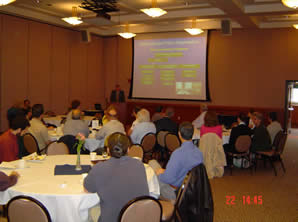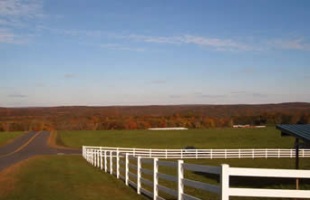Purpose
EPAC is advisory to the President, Provost and other senior administrators about strategies for enhancing the University's environmental performance in:
- Fostering environmentally sustainable development and mitigating the environmental impacts of our construction activities
- Improving environmental compliance in our operations
- Distinguishing our academic, operational and community outreach reputation by promoting environmental leadership initiatives
- Better integrating environmental principles into the University's governance by ensuring coordination with administrative advisory committees and task forces

Functions
The EPAC meets once per semester, or as needed, and may appoint committees and task forces in order to:
- Develop and revise UConn's environmental policy statement.
- Identify environmental risks and recommend goals, policies and procedures to address risks and improve environmental performance.
- Identify opportunities and sponsor initiatives designed to advance and achieve environmental sustainability.
- Develop strategies for building environmental awareness and engaging students, staff and faculty in environmental initiatives.
- Advise the University about conservation and development plans and activities.
- Formulate strategies for dealing with stakeholder groups on environmental issues.
- Monitor the University's environmental performance and sponsor periodic environmental reports.
- Help organize and promote outreach events and partnerships that showcase the University's environmental leadership.
- Nominate and select recipients of the University's environmental leadership awards.
2021 – 2022 EPAC Members
| Students & Alumni | One-year/Two-year terms |
| Alumni Representative | Brian Paganini, VP & Managing Director, Quantum BioPower (BUSI '03) |
| Undergraduate Student Representatives | Brandon Hermoza-Ricci, B.S. Civil Engineering, Urban & Community Studies 2022 Chase Mack, B.S. Environmental Science & B.A. Political Science 2023 |
| Graduate Student Representative | Sabit Nasir, M.S. Energy & Environmental Management |
| Academic Administrators & Faculty | Two-year terms |
| College of Health, Agriculture & Natural Resources (CAHNR) | Indrajeet Chaubey, Dean (Delegate) Jason Vokoun, Professor and Head, Department Natural Resources & the Environment (NRE), Director of Environmental Science B.S. Program |
| School of Engineering (SOE) | Kazem Kazerounian, Dean (Delegate) Maria Chrysochoou, Professor and Head, Department of Civil and Environmental Engineering |
| College of Liberal Arts & Sciences (CLAS) | Dean Juli Wade (Delegate) Lisa Park Boush, Associate Dean for Research and Graduate Affairs, Professor, Department of Geosciences |
| UConn Law School | Eboni Nelson, Dean (Delegate) Joseph MacDougald, Professor-in-Residence and Executive Director, Center for Energy and Environmental Law |
| At-Large Faculty | Two-year terms |
| Political Science | Oksan Bayulgen, Associate Professor and Director of Undergraduate Studies |
| Agriculture & Resource Economics | Syma Ebbin, Associate Professor In Residence, Research Coordinator of CT Sea Grant, Faculty Advisor, EcoHusky –Avery Point Campus |
| Geography | Carol Atkinson-Palombo, Associate Professor & Director of Environmental Studies B.A. Program |
| Center for Ecology and Evolutionary Biology | Mark Urban, Arden Chair and Professor of Ecology & Evolutionary Biology |
| Geography | Anji Seth, Professor, Department of Geography, Director of Atmospheric Science Group |
| EcoHouse Learning Community | Thomas Hayes, Associate Professor and Director of Graduate Studies Department of Political Science, Director EcoHouse Learning Community |
| Agricultural & Resource Economics | Kimberly Rollins, Professor and Department Head |
| President's Office | Two-year terms |
| University Communications | Tysen Kendig, Vice President (Delegate) Mike Enright, Deputy Spokesperson |
| Community Relations | Cara Workman, Senior Director of Operations, Office of the President and Director, University Events and Conference Services |
| Athletics | David Benedict, Director (Delegate) Evan Feinglass, Associate Director of Athletics, Facilities Management & Planning |
| Senior Operational Staff | Standing Member |
| Facilities Operations & Building Services | Mike Jednak, Associate Vice President |
| University Business Services, Purchasing Department | Gregory Daniels, Interim Associate Vice President & Chief Procurement Officer |
| University Planning, Design & Construction | Laura Cruickshank, Associate Vice President, Master Planner & Chief Architect (Delegate) Sean Vasington, Associate Director & University Landscape Architect |
| At-Large Members | Two-year terms |
| Facilities Operations & Building Services | Stanley Nolan, Director, Utility Operations & Energy Management |
| Center for Land Use Education & Research (CLEAR) | Chet Arnold, Extension Educator, Co-Founder, Center for Land Use Education and Research (CLEAR) and CT Nonpoint Education for Municipal Officials (NEMO), Director CLEAR |
| Dining Services | Tracey Roy, Interim Executive Director |
| Student Affairs | Pamela Schipani, Executive Director of Residential Life |
| Avery Point Campus | Jim O'Donnell, Executive Director of The Connecticut Institute for Resilience and Climate Adaptation (CIRCA), Professor of Marine Sciences, Joint Professor of Physics |
| Department of Extension | Juliana Barrett, Extension Educator with the Connecticut Sea Grant Program and Center for Land Use Education and Research |
| Facilities Operations & Building Services | Aris Ristau, Director, Building Services |
EPAC Workgroups
Membership in the EPAC workgroups is voluntary and consists of University faculty, staff, and students. If you are interested in joining one of these workgroups, please contact the workgroup chair whose information can be found on the websites below.
- Zero Waste: evaluates current campus recycling, diversion, and waste management programs and makes recommendations and goals for the implementation of new initiatives. This workgroup's focus is to transition UConn to becoming a Zero Waste Campus using a holistic, collaborative waste management approach.

Former Subcommittees and Related Workgroups
- Recycling and Waste Reduction Workgroup: formed to evaluate the effectiveness of components of the University recycling program and make recommendations for improvements and enhancements.
- Land Use and Sustainable Development Subcommittee: formed to develop "green"
 building and low-impact design principles for our construction program, foster open space conservation, and encourage natural resource protection and habitat restoration.
building and low-impact design principles for our construction program, foster open space conservation, and encourage natural resource protection and habitat restoration.
- Environmental Outreach Subcommittee: formed to promote environmental awareness and increase environmental responsibility within the UConn community; to enhance environmental literacy; and to improve the University reputation in environmental performance and community relations on environmental issues.
- Compliance and Best Practices Subcommittee: formed to examine initiatives that impact day to day operations at the University, including "green" procurement, waste management, conserving resources, and minimization of air and water quality impacts. The subcommittee has since expanded to several workgroups focused on specific initiatives within the CBP scope of goals.
- Environmental Literacy Workgroup: formed to assist in identifying and implementing initiatives that promote environmental awareness and education amongst the University community. This workgroup has since expanded to form the Green Campus Academic Network (GCAN), with the purpose of raising awareness among interested faculty members about opportunities for engagement and collaboration in campus sustainability activities, events, and research opportunities.
- UConn Climate Action Task Forces: Transportation,
Sustainable Development, Energy, and Water Conservation workgroups were appointed as part of the UConn Climate Action Task Forces. These task forces have since accomplished their primary task of writing their respective sections of the Climate Action Plan (CAP), but may be reconvened in the future for updates and revisions.
 building and low-impact design principles for our construction program, foster open space conservation, and encourage natural resource protection and habitat restoration.
building and low-impact design principles for our construction program, foster open space conservation, and encourage natural resource protection and habitat restoration.